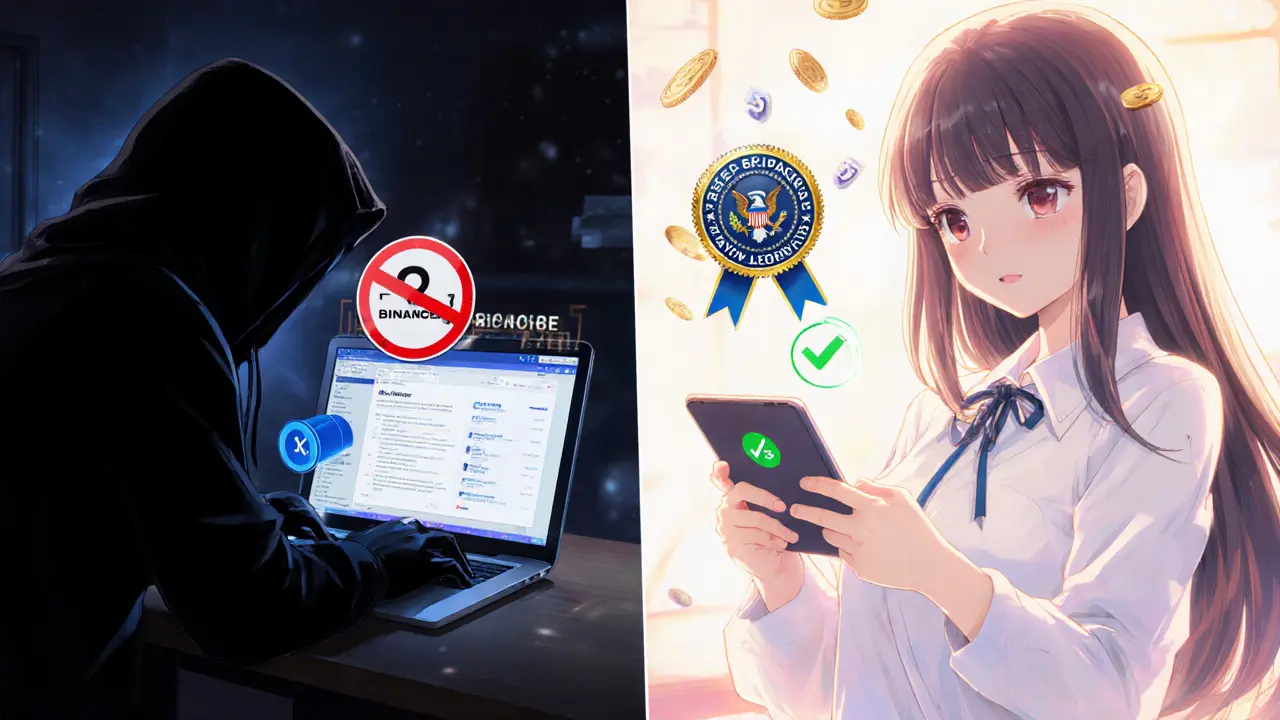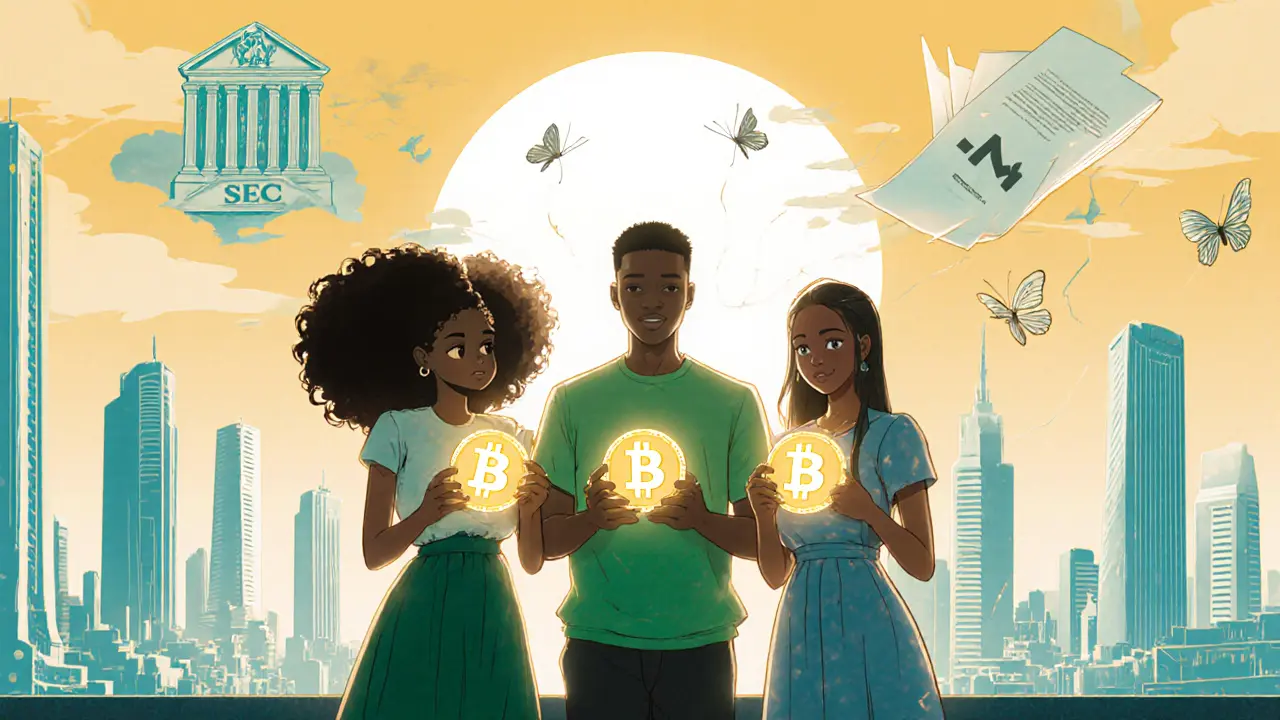Which Crypto Exchanges Are Banned in Nigeria? 2025 Guide

Crypto Exchange Checker
Check Exchange Status
Enter the name of a cryptocurrency exchange to see if it's licensed or banned in Nigeria according to 2025 regulations.
Licensed Exchanges in Nigeria (2025)
Quidax
LicensedNaira deposits, crypto trading, and fiat withdrawals available.
Bushi
LicensedLow-fee crypto purchases via bank transfer.
Banned/Restricted Exchanges in Nigeria (2025)
Binance
RestrictedNaira services blocked; only crypto-to-crypto trades allowed via VPN.
KuCoin
BannedNo license; blocked by ISPs; VPN required for access.
Coinbase
BannedNo Nigerian license; Naira transactions prohibited.
Kraken
BannedNo local licensing; access requires VPN (not recommended).
Key Takeaways
- Only exchanges with a valid SEC license can operate openly in Nigeria.
- Binance is restricted from Naira‑based services but still usable via VPN for crypto‑to‑crypto trades.
- Unlicensed platforms are effectively prohibited and risk heavy penalties.
- Quidax and Busha are the two domestic exchanges that have secured licensing.
- Staying compliant means using licensed services and keeping records for tax reporting starting 2026.
Ever wondered which crypto platforms you can safely use in Nigeria today? The country’s regulatory scene shifted dramatically in 2025, moving from a blanket ban to a licensing‑based system. This guide walks you through the current list of prohibited or restricted exchanges, explains why they’re blocked, and shows you the approved options you can trust.
Nigeria is a fast‑growing crypto market, handling over $92billion worth of digital assets between July2024 and June2025. The government now regulates the space through the Investments and Securities Act (ISA 2025), which treats digital assets as securities and puts the Securities and Exchange Commission (SEC) in charge of licensing.
How the Licensing System Works
The SEC requires every crypto exchange or Virtual Asset Service Provider (VASP) to register, meet AML/KYC standards, and submit regular compliance reports. If an exchange fails to obtain a license, the SEC can suspend or revoke its operations, effectively banning it from the Nigerian market. The Nigeria Tax Administration Act (NTAA 2025) adds a financial punch: non‑compliant VASPs face an initial fine of ₦10million (≈$6,693) plus ₦1million per month of continued breach.
What’s Actually Banned?
In practice, the ban targets any platform that operates without SEC approval. The most visible case is Binance. In February2024 the exchange stopped Naira‑based peer‑to‑peer trades, and local ISPs blocked its domain. Users can still log in, move crypto between wallets, and trade non‑Naira pairs-but they must use a VPN to bypass the block. Because Binance hasn’t secured a Nigerian license, its Naira services remain prohibited.
Other international platforms-such as KuCoin, Coinbase, and Kraken-have not applied for a license. While they aren’t officially “banned,” they fall into the same prohibited category: Nigerian residents cannot legally deposit or withdraw Naira through them, and any attempt to do so risks regulatory action.

Licensed Exchanges You Can Use
The SEC has approved a handful of domestic platforms that meet all compliance checks. The two that have launched successfully are:
- Quidax - a home‑grown exchange offering Naira deposits, crypto trading, and fiat withdrawals.
- Busha - another locally licensed VASP that focuses on low‑fee crypto purchases via bank transfer.
Both platforms implement robust KYC verification, transaction monitoring, and report directly to the SEC. They also cooperate with the Central Bank of Nigeria (CBN), which now permits banks to service licensed crypto businesses.
Comparison Table: Banned vs. Licensed Exchanges
| Exchange | Status | Reason / Requirement | Access Method |
|---|---|---|---|
| Binance | Restricted | No SEC license for Naira services | VPN for crypto‑to‑crypto only |
| KuCoin | Banned (unlicensed) | Never applied for Nigerian license | Blocked by ISPs; VPN required |
| Coinbase | Banned (unlicensed) | Lacks SEC approval | VPN needed; risky |
| Kraken | Banned (unlicensed) | No local licensing | VPN needed; not recommended |
| Quidax | Licensed | SEC approved, AML/KYC compliant | Direct access via website/app |
| Busha | Licensed | SEC approved, meets CBN guidelines | Direct access via website/app |
Staying on the Right Side of the Law
If you’re a trader, investor, or developer, here’s a quick checklist to avoid penalties:
- Confirm the exchange appears on the SEC’s official licensed list.
- Use only Naira‑enabled services that have a valid license.
- Complete full KYC verification-photo ID, address proof, and source‑of‑funds documentation.
- Keep transaction records for at least three years; you’ll need them when the NTAA 2025 tax regime kicks in (2026).
- Avoid VPNs for accessing banned platforms; regulators view it as circumvention.
Following these steps not only protects you from fines but also helps build a trustworthy crypto ecosystem in the country.

Risks of Using Banned Platforms
Operating on a prohibited exchange can lead to:
- Financial loss if the platform is shut down and funds are frozen.
- Legal charges, including the ₦10million base penalty and monthly fines.
- Difficulty withdrawing crypto to a local bank, because banks can no longer process transactions linked to unlicensed VASPs.
- Potential inclusion on watchlists maintained by the EFCC and NFIU, which could affect future banking access.
Future Outlook
Regulators are still fine‑tuning the framework. The SEC plans to review more applications throughout 2025, and the NTAA 2025 will introduce a withholding tax on crypto trades starting 2026. Expect clearer guidance on DeFi protocols and stablecoins soon-once those rules are set, additional platforms may qualify for licensing.
Frequently Asked Questions
Is Binance completely banned in Nigeria?
No. Binance can still be used for crypto‑to‑crypto trades, but its Naira‑based services are restricted because it lacks an SEC license. Access usually requires a VPN.
Can I use an international exchange if I convert crypto to USDT first?
Technically you can, but the transaction still counts as using an unlicensed VASP. If the platform does not have a Nigerian license, you risk regulatory action.
What are the penalties for operating on a banned exchange?
The NTAA 2025 sets a starting fine of ₦10million (about $6,693) for the first month of non‑compliance, plus ₦1million for each additional month.
How do I verify if an exchange is licensed?
Check the SEC’s official list of approved VASPs on its website. Licensed exchanges display their registration number and compliance badge.
Will my crypto holdings be safe if I switch to a licensed exchange?
Licensed exchanges must hold adequate capital reserves and follow AML/KYC standards, so your assets are better protected compared to unregulated platforms.

Ali Korkor
October 10, 2025 AT 13:06madhu belavadi
October 11, 2025 AT 10:02Dick Lane
October 11, 2025 AT 22:21Norman Woo
October 11, 2025 AT 23:51Serena Dean
October 12, 2025 AT 19:42James Young
October 13, 2025 AT 03:48Chloe Jobson
October 13, 2025 AT 07:16Andrew Morgan
October 13, 2025 AT 11:57Michael Folorunsho
October 14, 2025 AT 09:23Roxanne Maxwell
October 14, 2025 AT 11:44Jonathan Tanguay
October 14, 2025 AT 18:02Ayanda Ndoni
October 15, 2025 AT 09:34Elliott Algarin
October 15, 2025 AT 13:38John Murphy
October 15, 2025 AT 17:49Zach Crandall
October 16, 2025 AT 13:57Akinyemi Akindele Winner
October 17, 2025 AT 01:07Patrick De Leon
October 17, 2025 AT 12:36MANGESH NEEL
October 17, 2025 AT 15:12Petrina Baldwin
October 17, 2025 AT 21:41Sean Huang
October 18, 2025 AT 18:18